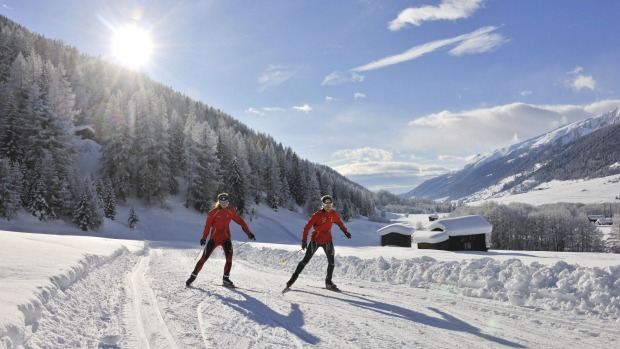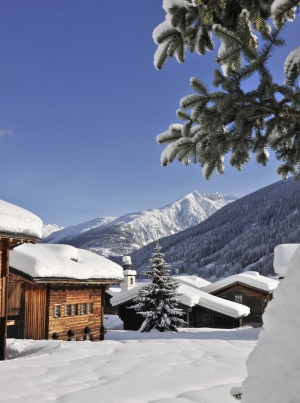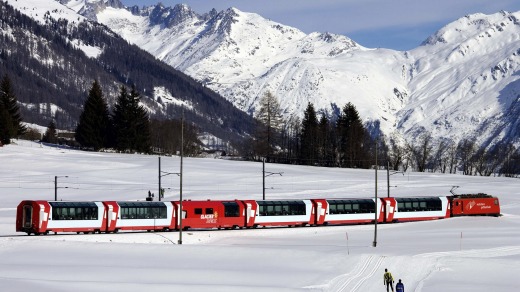
"Why do you want to go to Blitzingen?" the old man on the platform isn't so much asking a question as making a statement. Perhaps it's the snowboard bag I'm wheeling behind me, or the fact the crotch of my pants hangs curiously close to my knees. Or that clearly I can't speak German. Whatever it is, it's causing mild consternation on the platform in Niederwald. "Where are you going?" another man has walked over: to help, or to gawk? "Blitzingen," I tell him. "They don't get many like you there," he says with a smile.
Like me? An Australian? A snowboarder? Both? Either? He has a point, I've come to one of the only regions in Switzerland where there's a very long, very flat plateau in the Alps.
The train arrives a moment later. Villages whiz past: dark, ancient wooden homes with matching barns, all set round a central baroque church with an eye-catching steeple.

I've arrived in Obergoms, a small farming area at the upper end of the Valais region bordering France. It's the site of the country's most significant cross-country ski trail – and one of its first. The trail dates back centuries to when trade passed across the mountains from Bern to France and Italy. It runs for 96 kilometres between 12 tiny farming villages no one outside Obergoms has probably heard of.
So what on earth am I – a snowboarder – doing here? I've come because others don't. Every renowned ski resort in Switzerland is full of international tourists, all clambering for the deepest powder and the steepest ski turns. But here, there are more farmers than skiers, and if there is ever a queue – then just move on to the next village. And I've come because there's no better place in Europe to learn cross-country skiing – Obergoms has the best flat high valley in the Alps. And I'm here because every village on the trail is a stop on the Matterhorn Gotthard Railway, meaning that no matter where I am, help – and a train ride home – is never more than a cow pat throw away.
I'm picked up from the station at Blitzingen by the owner of the hotel I'm staying at. In workable English (his) and butchered German (mine), I discover he's just summited Everest (I think), but then I'd been warned Obergoms had a reputation for producing tough mountain folk. The view from my balcony: a tiny village coming to life as wispy low clouds creep across a jagged mountain range.

Each of the 12 villages along the Matterhorn Gotthard Railway offers cross-country ski rentals and lessons, but I'll be learning from a world champion, Koni Hallenbarter. I take the train to the village of Obergesteln where he runs a ski shop with a bar – but then, most ski shops in Obergoms come with a bar, in these mountains cross-country skiing and schnapps go hand in hand.
There are two main techniques in cross-country skiing: the classic, which involves a diagonal stride and takes more effort to learn; or skate skiing, a modern, easier type of skiing requiring the skier to slide on alternate skis at an angle from each other, a lot like ice skating.
Today, fortunately, I'll be skate skiing. As a life-long snowboarder, standing on the narrowest skis ever designed for snow feels ludicrous, and impossible. My baggy pants gather under the bottom of the ski and I'm thrown forward on to the hard snow in my first attempt to move. Hallenbarter stifles a laugh. I roll up the bottoms of my pants and proceed. "Keep your rhythm and keep your head up," Hallenbarter tells me. "Never stop moving. Don't think too much, it's like walking."
And to a large extent, it is. Granted, I have a groove to follow across perfect firm, smooth snow with no gradient, but within minutes it begins to make sense. And look: I'm skate skiing across a plateau in Switzerland, the sun is shining, and I'm blending in with the passers-by, greeting them with a cheery "Morgen". I wonder if they even know I'm not Swiss? I ski across the valley, lost in my thoughts. Till the Gugsa, that is. The Gugsa is a very strong and very cold wind that's infamous round these parts. It's turning my baggy pants and jacket into sails, and I'm jibing like an out-of-control catamaran with a flailing boom.
Fortunately, relief is never far away in Obergoms. I creep back to Obergesteln, seeking shelter in a traditional Swiss inn, where locals sit at wooden booths with their dogs at their feet. It's a world of doilies and gauche wall prints and red and white tablecloths. People are tucking into the oddly named local staple, Gommer Cholera, a potato and cheese pie.
It all feels as far from the glitz and glamour of Verbier or St Moritz as I can imagine. I order a hearty ale, and a schnapps, and breathe in the cheesy fumes and the not-so-unpleasant odour of wet dog and throw myself into the Obergoms apres-ski scene.
Apparently, cross-country skiing is as important as religion in Obergoms. I learn this when I eventually make it out of the inn and up the chilly valley to the last train stop of Obergoms, Oberwald. Kreuzer Otto – rugged up against the Gugsa in a battered old woollen beanie like a Swiss Ernest Hemingway – was just a boy at the time, but he remembers locals running their priest out of town just so they could ski. I'm at an old ski museum Otto helps to run, a hundred cross-country skis dating to 1896 take pride of place on the walls.
"Our town priest forbid cross-country skiing," he's telling me. "It was showing the body, he said. But the village banded together and kicked him out. No one gets in the way of cross-country skiing, not even a priest, it is the lifeblood of our towns."
Next morning in Blitzingen I'm set up in a pair of skis, and pushed off to my fate. I'd like to tell you I mastered the craft, that I channelled the spirits of Otto and long-dead Obergoms ski pioneers; that simply being here made me understand what I should be doing and that something bordering on divine intervention steered me onwards to the next village. But the truth is, I'm a snowboarder, and it shows. Falling, I find, works best to stop me in my tracks.
But it matters little. There's nothing around me now but a ski shop with a local's bar among 500-year-old farmhouses and barns in a quiet, sun-drenched valley. The only sound I hear are the toll of church bells on the hour and the occasional approaching train. At lunch, over a platter of meats and cheese, a local buys me a rosehip tea with schnapps and tells me in his rudimentary high-school English what I'm doing wrong. He talks as I pick at a cheese platter made from cows the barman milks that are owned by the bloke in the corner with the yellow jacket. And I know that wherever I go snowboarding from here, nothing will feel as Swiss as it does right now.
www.myswitzerland.com
www.obergoms.ch
Swiss International Air Lines flies from Sydney and Melbourne to Zurich (www.swiss.com), then take the train to Niederwald and Oberwald (www.myswitzerland.com/rail).
Stay at Hotel Castle in Blitzingen, see www.hotel-castle.ch; see www.obergoms.ch for all options.